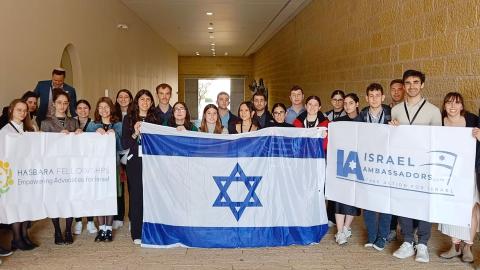Israeli Voters Divided, Christians Urged to Pray
JERUSALEM, Israel -- The question of which parties and which leader Israel will choose to lead their next government in Tuesday's election is still very much up in the air. The 2015 campaign features 26 parties, and even the pollsters are confused.
Pollster Rafi Smith, who has 35 years of experience conducting surveys in Israel, told reporters in a briefing Wednesday, "If you will ask me who's gonna be the next prime minister, I will tell you I don't know."
We do know that the next prime minister is going to be Benjamin Netanyahu or Labor Party leader Isaac Herzog. Either man could be asked to form a government after next Tuesday, March 17.
Smith's latest survey gives 40 Knesset seats to a right-leaning coalition led by Netanyahu and 40 seats to a left-leaning coalition led by Herzog. More current polls give the Zionist Union, led by Labor, a widening lead.
In recent elections, a whopping one-third of voters decided in the last 48 hours. This year 18 percent say they are undecided.
Netanyahu is now Israel's second longest-serving prime minister. If he wins another term, he would almost pass the country's founder and national icon, David Ben-Gurion.
That's just one of the reasons his political enemies, in Israel and around the world, are desperate to stop him.
Last weekend in Tel Aviv, tens of thousands of Israeli leftists gathered for an "anyone but Bibi" rally. Strengthened by large financial support from overseas and the blessing of Israeli and foreign media, some of Netanyahu's opponents call him a bigger danger to the world than Iran.
They accuse him of poisoning the relationship with the United States and hurting Israel's economy.
David Parsons, with the International Christian Embassy in Jerusalem, has closely followed the past eight national elections.
"There's been this attempt to create [a feeling], you know, things are collapsing with Bibi in office, this impression that the country is falling apart, that we gotta get rid of him," he said.
Still, Parsons doesn't see the anti-Netanyahu intensity as high as in 1999, when Labor leader Ehud Barak came from behind to defeat Netanyahu.
Even with many polls showing Netanyahu's Likud Party trailing, nearly every poll shows voters prefer him as prime minister to Herzog, who heads a coalition of the left.
Smith said that because Israelis don't have hope for an Arab peace partner, they've turned inward to look at domestic issues such as the high cost of food and housing.
He described the situation with the Arabs as "total distress."
"They don't like us, we have no partner, we have nothing to go, no one to talk to. So we actually [say to ourselves], 'Let's go inside, with more internal problems,'" Smith explained.
In the closing days, though, voters may return to security concerns. Even most of Netanyahu's opponents don't refute the threat to Israel's existence posed by Iran and radical jihadists.
Parsons believes it's a critical time for Christians everywhere to pray for Israel.
"First of all, we have to respect the democracy here. Israel has a vibrant democracy. We have to respect the people," Parsons told CBN News.
"And we can pray, 'Lord, let your man rise to power in here, the one You want to lead Israel over coming years,' because this is a very momentous time, especially with the Iranian nuclear threat. We need Christians all over the world praying for this nation," he said.



